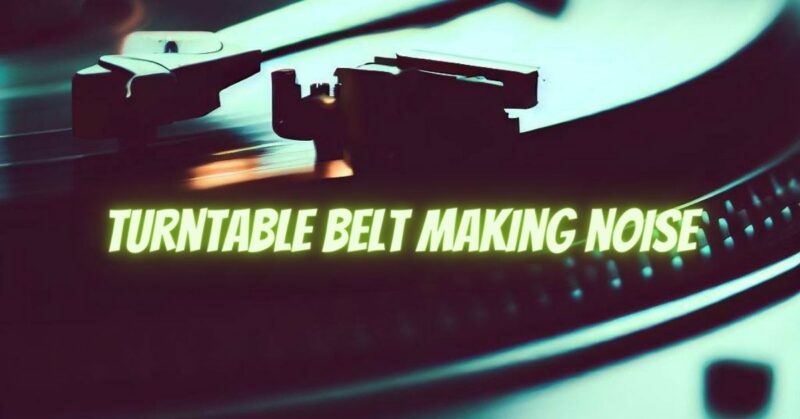A turntable belt is a crucial component that drives the platter, allowing for the smooth rotation of your vinyl records. However, if your turntable belt is making noise, such as squeaking, chirping, or rattling, it can detract from the audio experience and hinder your enjoyment of music. In this article, we will explore common causes of turntable belt noise and provide practical solutions to help you diagnose and resolve these issues, ensuring quiet and uninterrupted playback of your vinyl collection.
- Belt Alignment:
Improper alignment of the turntable belt can cause noise. Check if the belt is properly seated on both the motor pulley and the platter. Ensure that the belt is not twisted or off-center, as this can result in rubbing or misalignment. Adjust the belt carefully to ensure it is properly aligned, following the manufacturer’s guidelines or the turntable’s user manual.
- Belt Condition:
Over time, turntable belts can become worn, stretched, or damaged, leading to noise issues. Inspect the belt for any signs of wear, cracks, or degradation. If the belt appears worn or damaged, it may be necessary to replace it. Consult the turntable’s manufacturer or a reputable audio equipment supplier to find a compatible replacement belt for your specific turntable model.
- Belt Tension:
In some cases, improper belt tension can cause noise. Check if the belt tension is too loose or too tight. Each turntable model may have different tension requirements, so refer to the manufacturer’s guidelines or the turntable’s user manual for the recommended belt tension. Adjust the belt tension accordingly to achieve the optimal balance between stability and smooth operation.
- Belt Lubrication:
Lack of proper lubrication can contribute to turntable belt noise. Some turntable belts may benefit from a light application of silicone-based belt lubricant. Consult the turntable’s manufacturer or a professional technician for guidance on whether and how to lubricate the belt. Be cautious and follow the recommended procedure to avoid over-lubrication, which can lead to further problems.
- Turntable Motor:
In rare cases, the noise may originate from the turntable’s motor. If you have ruled out issues with the belt and the noise persists, it’s worth examining the motor. Ensure that the motor is clean and free from any debris or obstruction. If you suspect a motor-related problem, consult the turntable’s manufacturer or seek assistance from a qualified technician for further diagnosis and repairs.
- Regular Maintenance:
Performing regular maintenance on your turntable can help prevent belt noise. Keep the turntable clean and free from dust and debris. Avoid placing the turntable in environments with excessive humidity or temperature fluctuations, as these conditions can affect the belt’s performance. Additionally, follow the manufacturer’s guidelines for recommended maintenance intervals and procedures to ensure optimal turntable performance and minimize noise issues.
Conclusion:
Turntable belt noise can be an annoyance during your vinyl listening sessions. By checking belt alignment, assessing belt condition, adjusting belt tension, considering lubrication (if applicable), examining the turntable motor, and performing regular maintenance, you can effectively troubleshoot and resolve turntable belt noise issues. Remember to handle the belt and turntable components with care and consult the manufacturer’s guidelines or seek professional assistance when necessary. With proper attention and maintenance, you can restore the quiet and smooth operation of your turntable belt, allowing you to fully enjoy the sonic delights of your vinyl collection.


